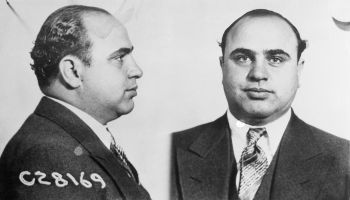VIA THE WASHINGTON POST:
To hear Quansa Thompson talk of her life as an exotic dancer, to listen to her describe how men offer cash as she sashays, gyrates and jiggles the night away, is to evoke a thousand titillating thoughts, not a single one having anything to do with the Federal Fair Labor Standards Act of 1938.
That is, until Thompson brings up the Depression-era law, which she discovered last summer after being fired by her then-employer, the House, a den of prurient entertainment on Georgia Avenue NW. Thompson is suing the House in U.S. District Court, alleging that the club pays dancers no wages, but ought to under the law. The club has denied the charge.
By her own account, Thompson — or “Love” as she calls herself onstage — had to overcome a good deal of self-doubt six years ago, when she started dancing alongside a veritable conga line of statuesque beauties with show biz names such as “Wild Cherry,” “French Kiss” and “Wet.”
She learned to feel the music, to move her hips just so, to smile with enough mystery that men in her audience leaned forward, hands extended, fingers offering up $20 bills, fifties, hundreds. The high-rollers, the “ballers,” as she called them, “would make it rain,” literally showering her with fistfuls of dollars.
“It’s like you’re a celebrity,” the 29-year-old brunette said. “You hypnotize them.”
In a given night, Thompson said, she could earn as much as $1,200, enough to inspire an arched eyebrow from the bank teller when she went to make the deposit. She said she made $80,000 to $100,000 a year, enough to buy herself a Grand Marquis, rent an apartment, take college-level classes, accumulate savings and fancy herself a budding Warren Buffett, whose biography she has read (“He’s a hustler, just like me”). Not bad for a woman who grew up in group homes in St. Louis, has no immediate family and says she once spent eight months in prison for armed robbery.
Yet Thompson said that aspects of the stripping life bothered her. The House paid her and the other dancers $20 for showing up each day, with the understanding that they could keep their tips after they paid the management a couple of fees: $20 to the DJ, $20 to the bartender. If a dancer was late to the stage, Thompson said, the club charged a $10 penalty. The fine for missing a shift was $80, even if it was because of an illness, which is what Thompson claimed when she didn’t show up for work one night last year.
” ‘Why would I have to pay you when you know I’m ill?’ ” she recalled asking her boss.
Thompson said she began talking about trying to form a union to advance the notion of dancers’ rights. When she threatened to sue the club’s owner, Darrell Allen, he told her to “Get in line,” she said. Allen barred her from the club, Thompson said, inspiring her research forays on the Internet, where she found that exotic dancers across the country have taken their employers to court.
Why couldn’t she?
Thompson found a lawyer, Philip Zipin, who, after some research, concluded that the House, like a preponderance of strip clubs nationwide, classified their dancers as “independent contractors,” as if they were plumbers, only without the tool belt (not to mention the shirt, pants and underwear).
Zipin said the House’s practices — its schedules, rules and fines — amount to treating dancers as if they were employees, but without paying minimum wage. “This is exploitation,” Zipin said. Thompson is seeking $75,000 from the House, an amount that includes the wages and overtime she said she would have collected had she been working full time.
Neither Allen or his lawyer, William Howard, responded to phone messages seeking comment.
Exotic dancers across the country have found success taking on their clubs on similar grounds.
“Unfortunately, it seems like a common practice not to pay dancers any wages,” said Sonia Lin, a New York-based lawyer whose firm represents a performer who is suing the Penthouse Executive Club in Manhattan. “It’s an unorganized industry, and there have been a lot of lawsuits. Because of the nature of the industry, it’s slow to change.”
Yet there are strippers who don’t want full-time gigs, who prefer the freedom of floating from club to club. “There are advantages — the write-offs, for one,” said Lia Scholl, founder of the now-defunct Star Light Ministries, which counseled exotic dancers. “You can write off breast augmentation. You can write off mileage. They can determine their own schedules and be their own bosses.”
The disadvantages of being an independent contractor include being responsible for one’s own Social Security taxes and not being entitled to workman’s compensation. “If you fall off the pole,” Scholl said, “there’s no safety net.”
Whether potential lawsuits trouble club owners is hard to say since many are squeamish about lifting the veil on their operations.
“I don’t want to say nothing about nothing,” said Tony Sigalas, owner of Louis’ Rogue, a club on K Street NW. A woman who identified herself as the administrator at Archibald’s, which bills itself as “D.C.’s premier gentlemen’s club,” hung up when asked how it pays its performers.
Daniel Irving, the owner of Irving’s, a Prince George’s County club, said he treats dancers as if they were patrons, charging them $20 admission, then letting them keep whatever they earn without any additional fees. To hire dancers as employees, he said, would require record-keeping and check-writing. Headaches, in other words.
The dancers, he said, don’t seem to mind his system. “There are always two or three girls who show up, maybe five,” he said.
Since she stopped dancing at the House, Thompson has ruminated about returning to school or starting a magazine called Rare Chocolate, devoted to showing off beautiful women of color. “Cosmo for men,” she said.
She’d be more than willing to return to the stage full time, if she were treated like a full-fledged member of the labor force, albeit one who awakes each day to get undressed for work. “It would be the best job,” she said. “People would have more respect for it.”
- Libya: Entertainment, Food, Languages, Places To Visit + More
- South Sudan: Entertainment, Food, Languages, Places To Visit + More
- Morocco: Entertainment, Food, Languages, Places To Visit + More
- Sudan: Entertainment, Food, Languages, Places To Visit + More
- Egypt: Entertainment, Food, Languages, Places To Visit + More














